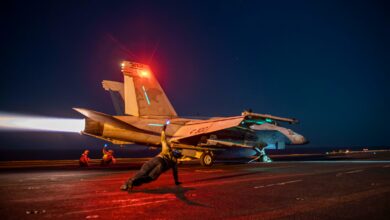Taliban strives to repeat Afghanistan’s deadly history with new spring offensive
Through its new "al-Khandaq" campaign, the Taliban aims to turn the tide of war in its favor, and peace seems increasingly further away
KABUL – In the turbulent history of modern Afghanistan, the last week of April has twice seen the destiny of the mountainous country alter course in absolutely diverse ways, and now the Taliban rebels desperately seek to orchestrate a third turn in their favor through their newly announced spring offensive.
Exactly 40 years ago, in the early spring of April 1978, the People’s Democratic Party of Afghanistan, a far-left party with pro-Soviet orientation, overthrew the government of Mohammad Daoud Khan in a bloody coup d’état. A little over a decade later, groups of Afghan Mujahideen backed by the U.S. and many Muslim countries rose to power in the backdrop of a bloody civil war in late April 1992.
Now, in the spring of 2018, ultimately rejecting the peace offer by the West-backed government in Kabul, the Taliban declared their yearly offensive dubbed as “al-Khandaq” on Wednesday, April 25. The name, meaning “the trench,” is derived from a battle fought by the Prophet Mohammad against his opponents in the city of Medina in 627.

Taliban spokesperson Zabihullah Mujahed in a social media post announced the yearly spring offensive highlighting the deadly aerial raid by Afghan security forces on a religious school in a Taliban-controlled area in Kunduz province earlier this month that caused multiple civilian casualties in addition to killing scores of top Taliban commanders, according to the local media and officials.
“The difference (in security operations) is that in the previous years of occupation [fall of the Taliban], mainly ‘Mujahideen,’ civilian people and rural areas were the prime targets of the aerial and ground attacks of foreign ‘occupying force’ but now mosques, religious educational centers and their innocent students have been added to the list and the indiscriminate bombardment of a religious madrassa in Dast-i-Archi district of Kunduz province is an instance at hand,” Mujahed said.
Officials insist an alleged gathering of the Taliban’s “Quetta Shura” – one of the Taliban’s main Pakistan-based committees – had been hit during an air raid.
Peace, an opportunity missed
In the face of a NATO-backed Afghan force, many analysts do not see the Taliban anywhere close to overthrowing the government, but in a number of provinces, including Logar, a few hours’ drive from Kabul, the rebels’ clout is persistent, making lives miserable for the locals.
Dost Mohammad, 38, a local farmer in Mohammad Agha district, told The Defense Post that locals are fearful of more bloodshed in the coming days and months.
“Despite many security operations the Taliban remain active here, and it is obvious more clashes would claim more lives this year with the new war season,” he said.
Afghan analysts also see the announcement of yet another deadly year of fighting by the Taliban as a setback for prospects for peace anytime soon.
Dr. Nezamuddin Katawazi, president of the Peace and Human Rights Organization (PHRO), said the continuation of the conflict also mounts to failure of efforts to pave the way for a peaceful settlement.
“In my views this [new war season] should have been avoided at a legitimate cost. After the offer to the Taliban for peace by the president there was no immediate rejection for a while from the Taliban, so without any doubt the incident in Kunduz did undermine prospects for the Taliban to enter peace process,” he told The Defense Post.
The threats posed by the Taliban, regardless of their limitations, can be gaged from the fact that they managed to kill the deputy governor of Logar province, Qamaruddin Shakib, in the Mohammad Agha district on April 26, second day of ‘al-Khandaq.’
The Taliban have also singled out U.S. President Donald Trump’s new and much more aggressive war strategy as a reason for their rebellion.

“Besides sustaining the ongoing ‘illegitimate occupation,’ the newly adopted war strategy of Trump has been ruthlessly implemented in the villages and rural areas against our oppressed Afghan people for the past nine months. Thousands of additional foreign forces are being deployed inside Afghanistan and they are supplied with new devastating weapons and vast military authorities,” the group’s spokesperson stated.
Force for peace
The powerful actors in this war, the U.S. and NATO are determined to keep pressure on the militants until they surrender for peace. NATO Secretary-General Jens Stoltenberg has said a clear message to the Taliban that they cannot win on the battlefield would push them to engage with the peace process in Afghanistan.
Addressing a press conference after the NATO foreign ministers meeting in Brussels on April 27, he said it is obvious if the Taliban believed that it is possible to win on the battlefield they would be less inclined to sit down at the negotiation table.
“So, therefore there is a close link between NATO’s message on support for Afghan National Security Forces and Army and the possibility for President Ghani to invite the Taliban to peace talks,” he told reporters.
Amid all this, war-weary Afghans like Dost Mohammad of Mohammad Agha district do not see an end to their suffering.
“I am absolutely certain there is not a single family in this country that hasn’t lost their loved ones to this ‘cursed war,’ he said. “I lived my whole life with the war, death and destruction … and who knows if I would ever see peace prevail in my lifetime.”
Another such blatant attack claimed the lives of at least 11 religious school students in a populated area of southern Kandahar province on Monday.
Early in the day, a suicide vehicle bomb detonated in Daman district, injuring eight members of the NATO Resolute Support mission, and killing several Afghan police and civilians, including the 11 children. The Romanian ministry of defense confirmed that eight of its soldiers deployed with the mission were injured.
Deadly airstrike on school is latest blow to Afghanistan peace prospects












